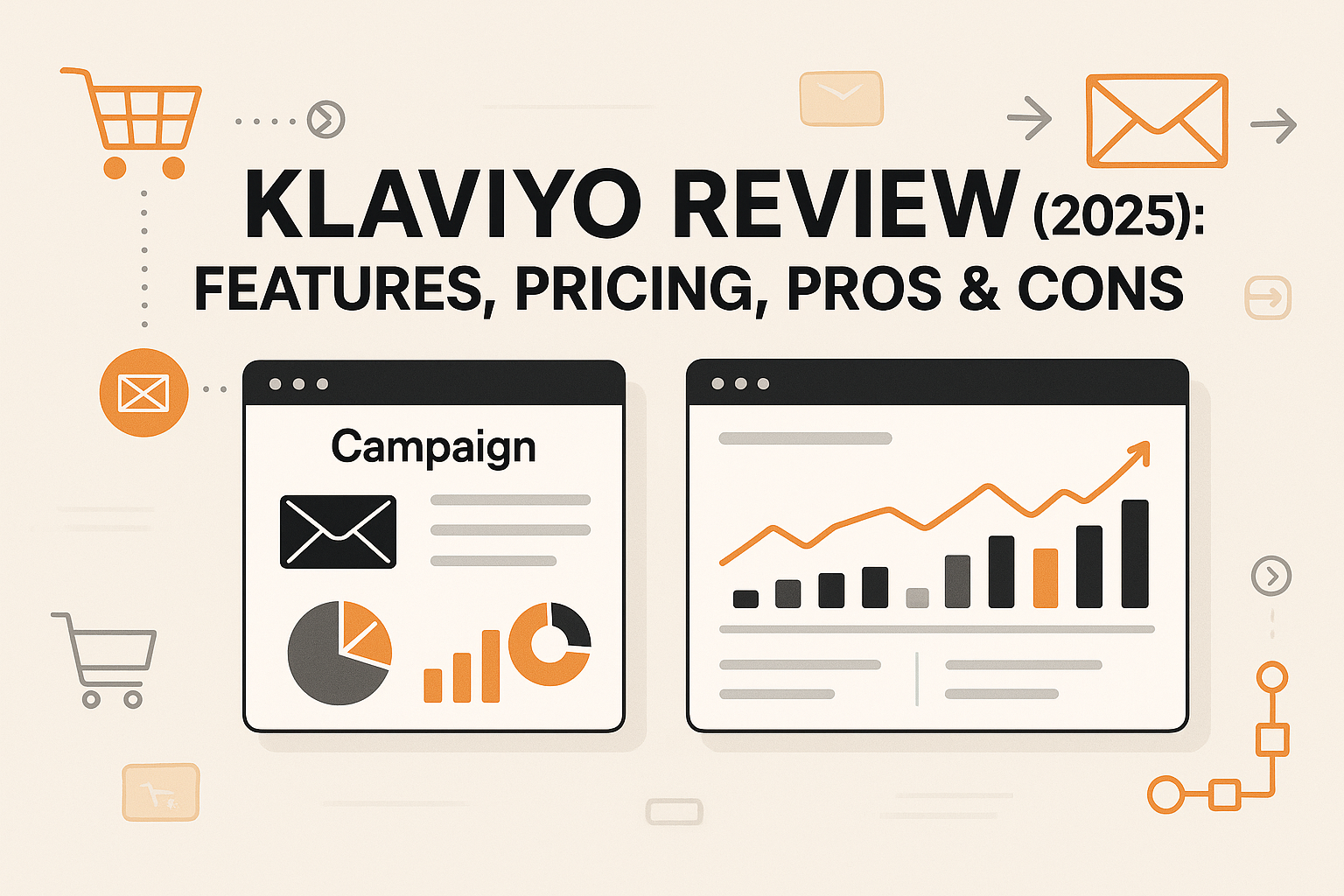Executive Summary
Klaviyo stands out as the premier email marketing platform specifically designed for e-commerce businesses, offering sophisticated automation workflows, advanced segmentation capabilities, and seamless integrations with major e-commerce platforms. This comprehensive Klaviyo review examines the platform's features, pricing structure, competitive advantages, and potential limitations to help you determine if it's the right marketing automation solution for your business.
The Bottom Line: Klaviyo excels as a B2C CRM platform that combines email marketing, SMS marketing, and customer data management in a unified system. While it commands premium pricing compared to general email marketing tools, its e-commerce specialization and advanced personalization capabilities deliver exceptional ROI for online retailers and consumer brands.
Key Highlights
•Specialization: Purpose-built for e-commerce and B2C marketing
•Data Integration: Unified customer data platform with 350+ integrations
•Automation: Advanced automation workflows with AI-powered optimization
•Personalization: Dynamic product recommendations and behavioral targeting
•Multi-channel: Seamless email, SMS, and mobile push messaging
•Analytics: Comprehensive reporting with revenue attribution
•Customer Base: Powers 176,000+ relationship-driven brands
•ROI: Claims 63x average return on investment for email marketing
What is Klaviyo?
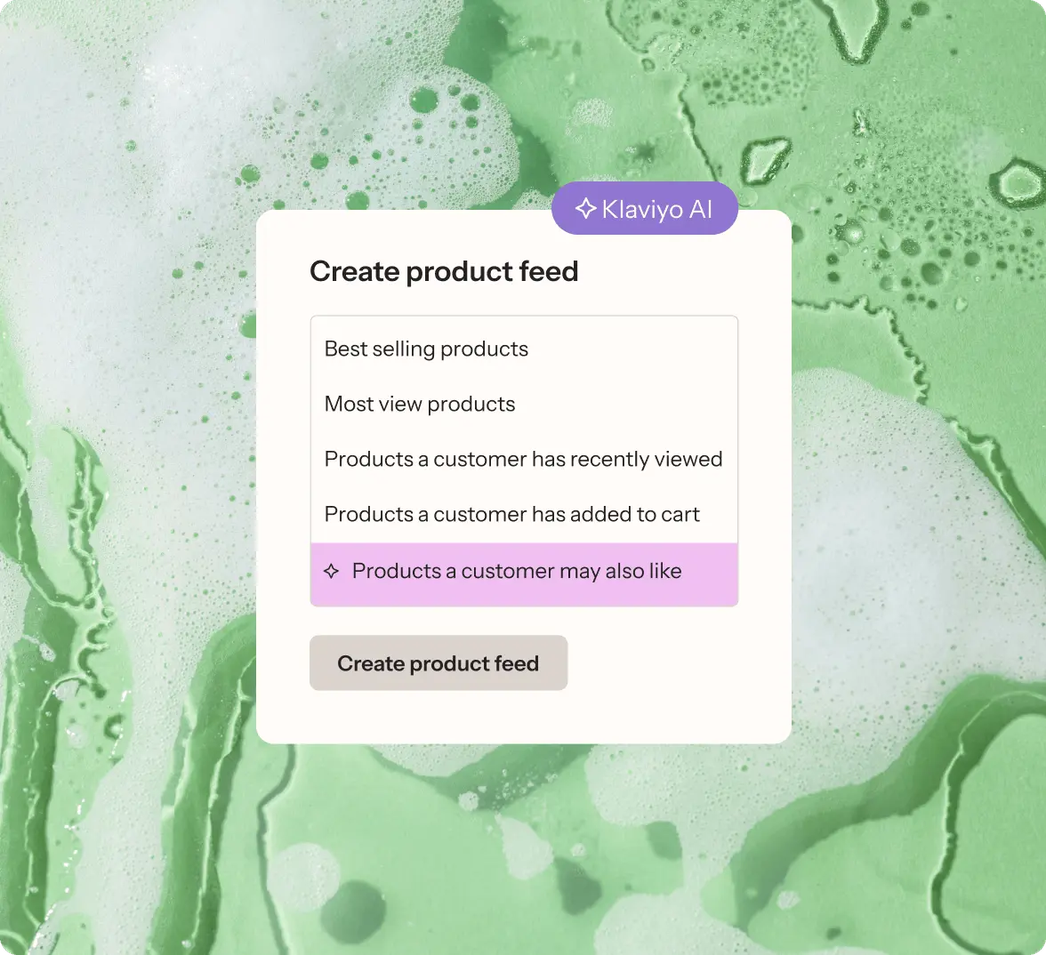
Klaviyo is a comprehensive marketing automation platform that positions itself as "the only CRM built for B2C" (Business-to-Consumer) marketing. Founded in 2012, the platform has evolved from a simple email marketing tool into a sophisticated customer relationship management system specifically designed for e-commerce businesses and consumer brands.
Unlike traditional email marketing platforms that serve general business needs, Klaviyo focuses exclusively on the unique requirements of online retailers, direct-to-consumer brands, and businesses that sell physical products to individual customers. This specialization allows the platform to offer deep e-commerce integrations, advanced product recommendation engines, and behavioral tracking capabilities that generic marketing tools simply cannot match.
The platform combines four core components into a unified system: marketing automation (including email and SMS campaigns), customer service tools, analytics and reporting, and a comprehensive data platform that unifies customer information from multiple touchpoints. This integration enables businesses to create highly personalized customer journeys based on real-time behavioral data, purchase history, and engagement patterns.
Klaviyo's customer data platform serves as the foundation for all marketing activities, automatically collecting and organizing information from website interactions, purchase behavior, email engagement, SMS responses, and third-party integrations. This data powers sophisticated segmentation capabilities that allow marketers to create highly targeted campaigns based on virtually any customer attribute or behavior pattern.
The platform's automation workflows, known as "flows," enable businesses to create complex customer journeys that respond dynamically to individual actions and preferences. These flows can span multiple channels, automatically determining whether to send an email, SMS message, or mobile push notification based on customer preferences and engagement history.
What sets Klaviyo apart from competitors is its deep understanding of e-commerce customer lifecycles. The platform includes pre-built automation templates for common e-commerce scenarios such as abandoned cart recovery, post-purchase follow-ups, win-back campaigns for inactive customers, and product recommendation sequences. These templates are based on best practices derived from analyzing billions of customer interactions across Klaviyo's extensive client base.
The platform's AI capabilities, branded as "Klaviyo AI," enhance every aspect of the marketing process. From optimizing send times and subject lines to predicting customer lifetime value and identifying churn risk, artificial intelligence helps marketers make data-driven decisions that improve campaign performance and customer engagement.
Klaviyo's global reach extends to over 20 countries for SMS marketing, making it suitable for international e-commerce operations. The platform maintains compliance with various data protection regulations, including GDPR and CCPA, ensuring that businesses can operate confidently in multiple jurisdictions while maintaining customer trust.
Core Features Analysis
Email Marketing and Campaign Builder

Klaviyo's email marketing capabilities represent the platform's core strength, offering a sophisticated campaign builder that balances ease of use with advanced functionality. The drag-and-drop email editor provides an intuitive interface for creating professional-looking emails without requiring technical expertise, while still offering the flexibility needed for complex, data-driven campaigns.
The campaign builder includes over 160 customizable email templates designed specifically for e-commerce use cases. These templates go beyond generic layouts to include specialized designs for product launches, seasonal promotions, abandoned cart recovery, and customer retention campaigns. Each template incorporates e-commerce best practices, such as prominent product imagery, clear call-to-action buttons, and mobile-responsive designs that ensure optimal viewing across all devices.
Dynamic content capabilities allow marketers to create single email templates that automatically personalize content for different customer segments. Product recommendation blocks can display different items based on browsing history, past purchases, or predictive algorithms that identify products most likely to interest each recipient. This level of personalization significantly improves engagement rates and conversion performance compared to static, one-size-fits-all email content.
The platform's AI-powered content generation tools help marketers create compelling email copy and subject lines quickly. These tools analyze successful campaigns across Klaviyo's network to suggest high-performing language patterns and optimize content for specific audiences. A/B testing capabilities enable continuous optimization of email elements, from subject lines and send times to content layout and call-to-action placement.
Advanced segmentation features allow marketers to target emails with surgical precision. Segments can be created based on any combination of demographic data, behavioral patterns, purchase history, engagement metrics, and custom properties. Real-time segment updates ensure that customers automatically move between segments as their behavior and preferences evolve, enabling truly dynamic marketing campaigns.
Email deliverability receives significant attention in Klaviyo's infrastructure design. The platform maintains dedicated IP addresses and implements advanced authentication protocols to ensure high inbox placement rates. Automated reputation management tools monitor sending patterns and adjust delivery strategies to maintain optimal deliverability performance across different email providers.
Automation Workflows and Flows
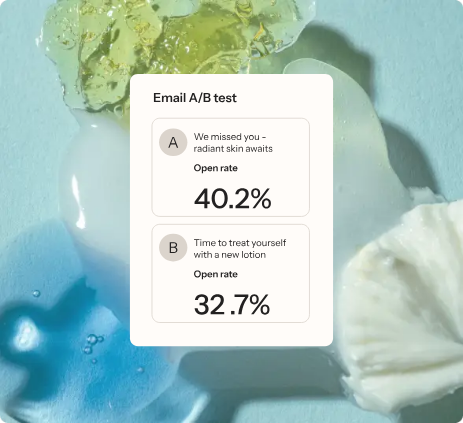
Klaviyo's automation capabilities, implemented through its "flows" feature, represent one of the platform's most powerful differentiators. These automation workflows enable businesses to create sophisticated customer journeys that respond intelligently to individual behaviors, preferences, and lifecycle stages.
The flow builder uses a visual interface that allows marketers to design complex automation sequences without programming knowledge. Flows can incorporate multiple triggers, conditional logic, time delays, and cross-channel messaging to create highly personalized customer experiences. The platform includes pre-built flow templates for common e-commerce scenarios, but also provides the flexibility to create completely custom automation sequences.
Trigger options for flows are extensive and include website behavior (page views, product interactions, cart abandonment), purchase activity (first purchase, repeat orders, specific product categories), engagement patterns (email opens, link clicks, SMS responses), and custom events tracked through integrations or API calls. This comprehensive trigger system enables businesses to respond to virtually any customer action in real-time.
Conditional logic within flows allows for sophisticated decision-making based on customer data. Flows can branch in different directions based on factors such as purchase history, geographic location, engagement levels, or custom properties. This branching capability enables the creation of highly targeted experiences that feel personally relevant to each customer.
Time-based elements in flows can be configured with precision, allowing for delays measured in minutes, hours, days, or weeks. Smart timing features can optimize send times based on individual customer engagement patterns, ensuring that messages arrive when recipients are most likely to engage.
Cross-channel capabilities enable flows to seamlessly integrate email, SMS, and mobile push notifications within a single automation sequence. The platform's AI can automatically determine the optimal channel for each customer interaction based on historical engagement patterns and preferences.
Flow performance analytics provide detailed insights into automation effectiveness, including conversion rates, revenue attribution, and customer journey visualization. These analytics help marketers identify optimization opportunities and understand how different flow elements contribute to overall campaign success.
Segmentation and Customer Profiles
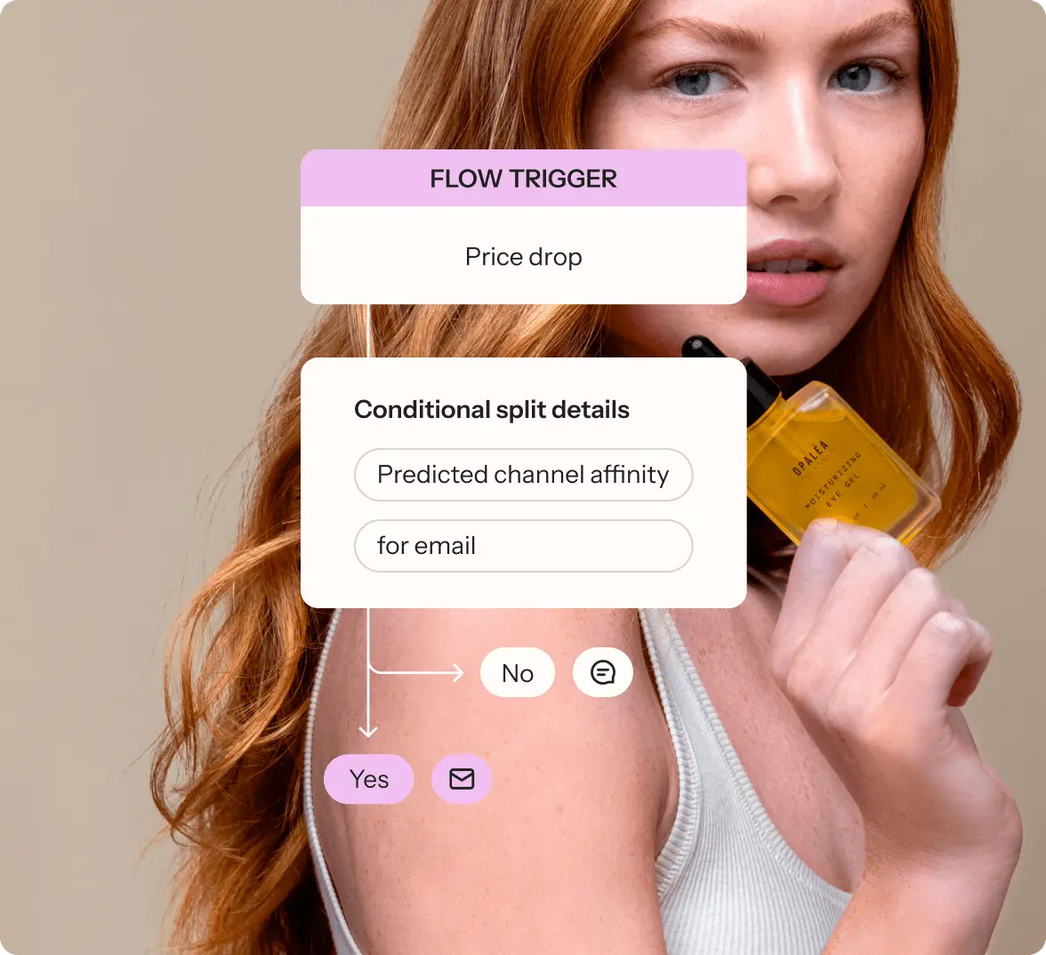
Klaviyo's segmentation capabilities are among the most sophisticated available in the email marketing space, enabling marketers to create highly targeted customer groups based on virtually any data point or behavioral pattern. The platform's approach to segmentation goes far beyond basic demographic information to include real-time behavioral data, predictive analytics, and complex multi-criteria filtering.
Customer profiles serve as the foundation for all segmentation activities, automatically aggregating data from multiple touchpoints to create comprehensive individual records. These profiles include purchase history, website behavior, email engagement metrics, SMS interactions, social media activity (where integrated), and custom properties defined by the business. The platform continuously updates these profiles in real-time as new data becomes available.
Dynamic segmentation ensures that customer groups automatically update as individual behaviors and characteristics change. This real-time updating capability means that customers can move between segments based on their actions, ensuring that marketing messages remain relevant and timely. For example, a customer who makes their first purchase automatically moves from a "prospects" segment to a "first-time buyers" segment, triggering appropriate follow-up communications.
Predictive segmentation uses machine learning algorithms to identify customers likely to exhibit specific behaviors, such as making a repeat purchase, churning, or becoming high-value customers. These predictive segments enable proactive marketing strategies that can influence customer behavior before negative patterns emerge.
Advanced filtering options allow for complex segment creation using multiple criteria combined with AND/OR logic. Marketers can create segments based on combinations of purchase behavior, engagement patterns, demographic information, and custom properties. The platform's interface makes it easy to build these complex segments without requiring technical expertise.
Segment performance tracking provides insights into how different customer groups respond to marketing campaigns. This data helps marketers understand which segments are most valuable and which messaging strategies work best for different customer types.
Multichannel Campaigns
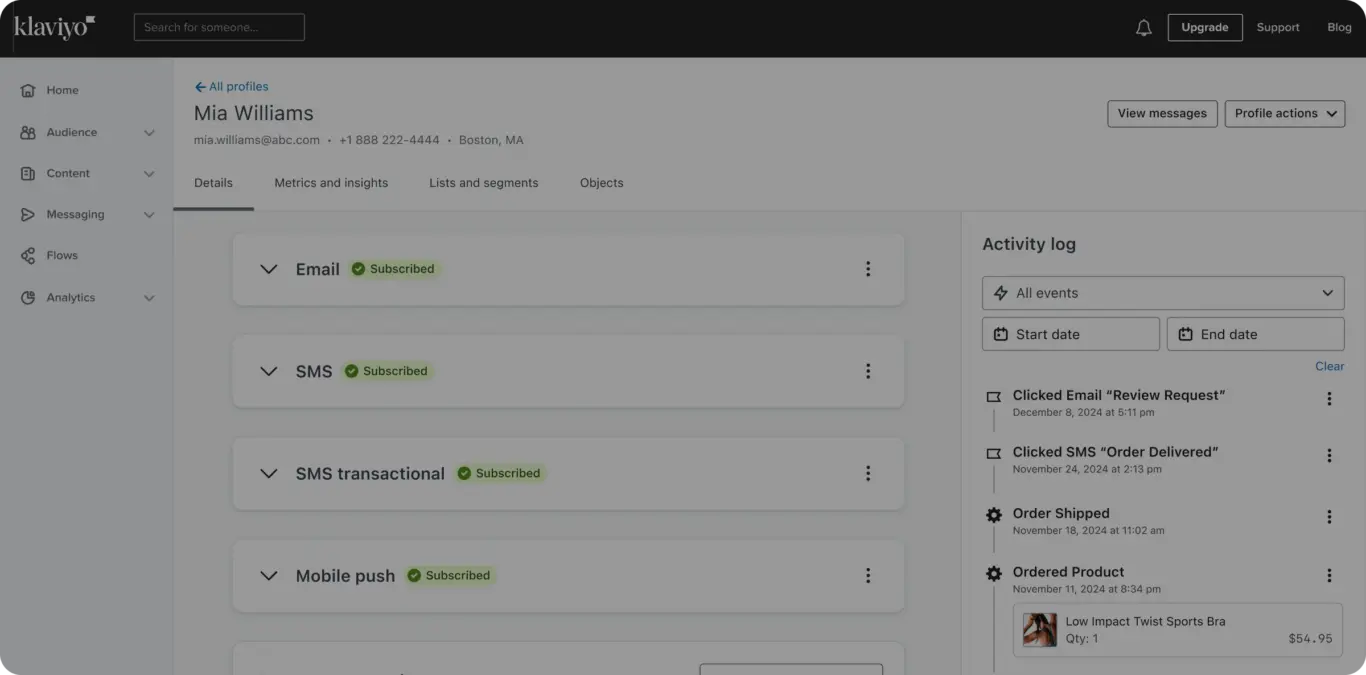
Klaviyo's multichannel approach integrates email, SMS, and mobile push notifications into cohesive marketing campaigns that reach customers through their preferred communication channels. This unified approach ensures consistent messaging across touchpoints while optimizing engagement through channel-specific strategies.
Email campaigns benefit from Klaviyo's deep e-commerce integration, automatically pulling product information, pricing, and inventory data to create dynamic, up-to-date content. Product recommendation engines analyze customer behavior to suggest relevant items, while inventory management features can automatically exclude out-of-stock products from promotional emails.
SMS marketing capabilities include both promotional and transactional messaging, with separate consent management for each type. The platform supports SMS campaigns in over 20 countries and includes features for two-way conversations, automated responses, and keyword-based opt-ins. SMS automation can be triggered by the same events as email campaigns, enabling coordinated cross-channel experiences.
Mobile push notifications extend reach to customers using mobile apps, with targeting capabilities that mirror email and SMS segmentation options. Push notifications can be triggered by location data, app usage patterns, or any other customer behavior tracked by the platform.
Channel optimization features use AI to determine the best communication channel for each customer interaction. The platform analyzes historical engagement patterns to predict which channel is most likely to generate a response from each individual customer, automatically routing messages accordingly.
Cross-channel attribution tracking ensures that revenue and conversion metrics are accurately assigned to the appropriate marketing touchpoints. This comprehensive attribution helps marketers understand the true impact of their multichannel campaigns and optimize budget allocation across different channels.
A/B Testing and Optimization
Klaviyo's A/B testing capabilities extend across all marketing channels and campaign elements, enabling continuous optimization of marketing performance through data-driven experimentation. The platform's approach to testing goes beyond simple subject line comparisons to include comprehensive campaign optimization strategies.
Email A/B testing options include subject lines, preview text, sender names, send times, content variations, and call-to-action elements. Tests can be configured to automatically select winning variations based on predefined success metrics, such as open rates, click-through rates, or revenue generation. The platform's statistical significance calculations ensure that test results are reliable and actionable.
SMS A/B testing enables optimization of message content, send times, and call-to-action strategies. Given the character limitations of SMS messages, testing becomes particularly important for maximizing the impact of concise communications.
Flow A/B testing allows marketers to test different automation strategies, comparing the performance of various trigger conditions, message sequences, and timing strategies. This capability enables optimization of entire customer journey experiences rather than just individual messages.
Multivariate testing capabilities enable simultaneous testing of multiple campaign elements, helping marketers understand how different components interact to influence overall performance. This advanced testing approach can reveal optimization opportunities that simple A/B tests might miss.
Personalized campaign AI takes testing to the next level by automatically creating and testing multiple campaign variations for different customer segments. The platform's AI determines the optimal version for each individual recipient based on their historical preferences and behavior patterns, essentially running thousands of micro-tests simultaneously.
Testing analytics provide detailed insights into experiment results, including confidence intervals, statistical significance indicators, and performance breakdowns by customer segment. These analytics help marketers make informed decisions about implementing test results and planning future optimization strategies.
Pricing Structure and Value Analysis
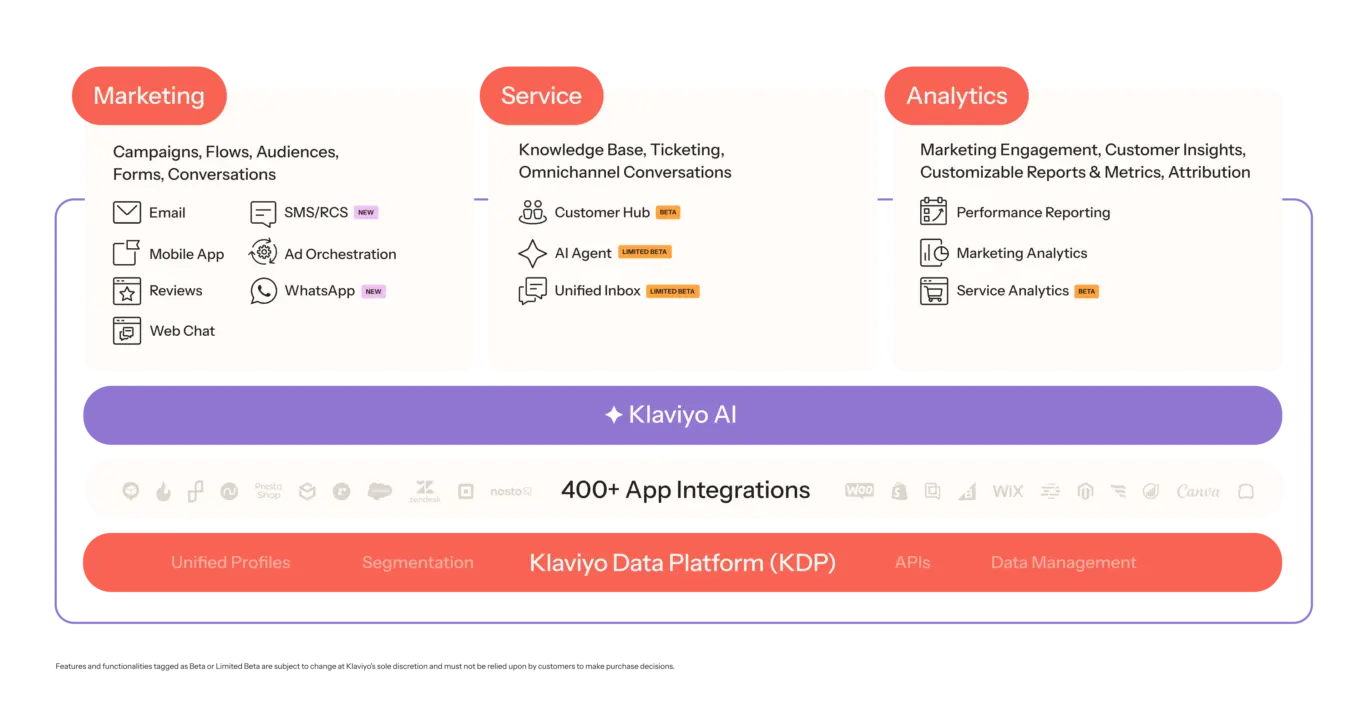
Klaviyo employs a tiered pricing model based on the number of active profiles in your database, with additional costs for SMS messaging and premium features. This pricing structure reflects the platform's focus on growing businesses and scales with your customer base expansion.
Core Pricing Tiers
Free Plan ($0/month)The free tier provides an excellent entry point for small businesses and startups, supporting up to 250 active profiles with 500 monthly email sends and 150 SMS/MMS credits. This plan includes essential features such as built-in reporting dashboards, email support for the first 60 days, generative AI content creation, and multi-channel segmentation capabilities. However, advanced features like sophisticated automation workflows and detailed analytics are limited.
Email Plan (Starting at $45/month)The email-only plan begins at $45 monthly for 1,001-1,500 active profiles and includes 15,000 email sends per month. This tier provides access to customer profiles with all-time data retention, 350+ built-in integrations, comprehensive reporting dashboards, email support, AI-powered content generation, and advanced segmentation capabilities. The email plan suits businesses focused primarily on email marketing without immediate SMS needs.
Email + SMS Plan (Starting at $60/month) - RecommendedKlaviyo's recommended plan combines email and SMS marketing for $60 monthly, supporting 1,001-1,500 active profiles with 15,000 emails and 1,250 SMS/MMS credits per month. This plan includes all email plan features plus SMS marketing capabilities, making it ideal for businesses seeking comprehensive multichannel marketing automation. The $15 premium over the email-only plan represents excellent value for the added SMS functionality.
Additional Services and Add-ons

Reviews Module ($25/month)The Reviews add-on, priced based on monthly order volume starting at $25 for 250 orders, enables businesses to collect and display product reviews within Klaviyo. This module integrates review data with marketing campaigns, allowing for targeted messaging based on customer feedback and automated review request sequences.
Marketing Analytics ($100/month)Advanced analytics capabilities cost $100 monthly based on active profile count, providing enhanced insights into customer purchase behavior, catalog performance, and trend analysis. This add-on enables sophisticated reporting that goes beyond basic campaign metrics to include predictive analytics and customer lifetime value calculations.
Advanced Klaviyo Data Platform ($500/month)The premium data platform tier, starting at $500 monthly for 100,000 total profiles, includes all Marketing Analytics features plus data warehouse synchronization, no-code transformations, and advanced data management capabilities. This tier targets enterprise customers requiring sophisticated data integration and custom analytics workflows.
Pricing Scalability and Value Proposition
Klaviyo's pricing scales progressively with business growth, ensuring that costs remain proportional to the value derived from an expanding customer base. The platform's pricing calculator allows businesses to estimate costs based on their specific profile counts and SMS usage requirements, providing transparency in budget planning.
For small businesses (under 1,000 profiles), Klaviyo's pricing may appear premium compared to basic email marketing tools. However, the platform's e-commerce specialization and advanced features often justify the cost through improved conversion rates and customer lifetime value. The free plan provides an excellent opportunity to evaluate the platform's capabilities before committing to paid tiers.
Mid-market businesses (1,000-25,000 profiles) typically find Klaviyo's pricing competitive when considering the comprehensive feature set and potential ROI. The platform's ability to drive revenue through sophisticated automation and personalization often results in positive return on investment within the first few months of implementation.
Enterprise customers benefit from Klaviyo's scalable infrastructure and advanced features, though pricing can become significant for very large databases. The platform's enterprise support and custom integration capabilities often justify the investment for businesses requiring sophisticated marketing automation at scale.
Cost Comparison and ROI Considerations
When evaluating Klaviyo's pricing, it's essential to consider the total cost of ownership, including implementation time, training requirements, and potential revenue impact. The platform's pre-built e-commerce integrations and templates can significantly reduce implementation costs compared to more generic marketing automation tools that require extensive customization.
Klaviyo's claimed 63x average ROI for email marketing, while impressive, should be evaluated in the context of your specific business model and customer base. E-commerce businesses with strong product-market fit and engaged customer bases are most likely to achieve exceptional returns, while businesses with low-margin products or infrequent purchase cycles may see more modest results.
The platform's transparent pricing model eliminates hidden fees and provides predictable cost scaling as your business grows. Unlike some competitors that charge based on email volume or feature usage, Klaviyo's profile-based pricing aligns costs with actual business value rather than marketing activity levels.
International Pricing and Currency Considerations
Klaviyo prices its services in US dollars globally, which may create currency fluctuation risks for international customers. However, the platform's global SMS coverage and compliance with international data protection regulations provide value for businesses operating across multiple markets.
SMS pricing varies by country and carrier, with detailed pricing information available in the platform's documentation. Businesses planning significant SMS marketing campaigns should carefully evaluate per-message costs in their target markets to ensure budget alignment.
Competitive Analysis
Klaviyo vs ActiveCampaign
The comparison between Klaviyo and ActiveCampaign represents a choice between e-commerce specialization and general marketing automation versatility. ActiveCampaign offers more comprehensive sales automation features, advanced workflow capabilities, and broader integration options, making it suitable for diverse business types including B2B companies, service providers, and complex sales organizations.
Klaviyo's advantages over ActiveCampaign include superior e-commerce integration depth, more sophisticated product recommendation engines, better mobile commerce optimization, and specialized features for online retail scenarios. The platform's customer data platform is specifically designed for consumer behavior tracking, providing insights that general marketing automation tools cannot match.
ActiveCampaign excels in areas where Klaviyo shows limitations, particularly in sales automation, lead scoring sophistication, and multi-trigger automation workflows. ActiveCampaign's automation builder allows for more complex conditional logic and supports multiple triggers per automation, while Klaviyo's flows are limited to single triggers with simpler branching logic.
Pricing comparison shows similar costs for comparable feature sets, though ActiveCampaign lacks a free plan while offering more affordable entry-level pricing for small businesses. Klaviyo's free tier provides significant value for startups, while ActiveCampaign's paid plans may offer better value for businesses requiring advanced sales automation features.
Klaviyo vs Mailchimp
Mailchimp represents the traditional email marketing approach with broad appeal and beginner-friendly features, while Klaviyo focuses specifically on e-commerce excellence. Mailchimp's strength lies in its ease of use, extensive template library, and comprehensive marketing channel support including social media advertising and landing page creation.
Klaviyo's e-commerce specialization provides significant advantages for online retailers, including deeper integration with e-commerce platforms, more sophisticated behavioral tracking, and advanced product recommendation capabilities. The platform's customer data platform offers more comprehensive customer profiling than Mailchimp's basic contact management system.
Mailchimp's broader feature set includes website building, social media management, and advertising tools that Klaviyo doesn't offer. However, these additional features may not provide significant value for businesses primarily focused on email and SMS marketing automation.
From a pricing perspective, Mailchimp can be more affordable for businesses with large email lists but minimal automation needs. Klaviyo's pricing structure favors businesses that prioritize sophisticated automation and personalization over simple broadcast email campaigns.
Klaviyo vs Omnisend
Omnisend positions itself as another e-commerce-focused marketing automation platform, creating direct competition with Klaviyo in the online retail space. Both platforms offer similar core features including email marketing, SMS automation, and e-commerce integrations, but differ in their approach to advanced functionality and pricing models.
Klaviyo's customer data platform provides more comprehensive customer profiling and behavioral tracking capabilities compared to Omnisend's more basic contact management system. The depth of data integration and analysis available in Klaviyo enables more sophisticated personalization and predictive marketing strategies.
Omnisend offers competitive pricing that may appeal to smaller e-commerce businesses, particularly those just beginning to explore marketing automation. However, Klaviyo's more advanced features and superior integration depth often justify the price premium for businesses serious about maximizing their marketing automation ROI.
Both platforms provide strong e-commerce integration capabilities, but Klaviyo's longer market presence and larger customer base have resulted in more mature integrations and better-tested automation templates. Omnisend's newer platform may offer more modern interface design but lacks the proven track record of Klaviyo's established workflows.
Klaviyo vs ConvertKit (Kit)
ConvertKit, recently rebranded as Kit, targets content creators, bloggers, and online course creators with a focus on simplicity and creator-specific features. This positioning creates minimal direct competition with Klaviyo's e-commerce focus, but some overlap exists for businesses selling digital products or operating creator-commerce models.
Klaviyo's e-commerce features far exceed ConvertKit's capabilities for physical product sales, inventory management, and complex customer journey automation. The platform's product recommendation engines, abandoned cart recovery, and purchase behavior tracking provide functionality that ConvertKit simply doesn't offer.
ConvertKit excels in areas important to content creators, such as landing page creation, lead magnet delivery, and subscriber tagging based on content engagement. The platform's simplicity and creator-focused features make it more suitable for businesses built around content marketing and digital product sales.
Pricing comparison shows ConvertKit as more affordable for basic email marketing needs, while Klaviyo provides better value for businesses requiring sophisticated e-commerce automation. The choice between these platforms typically depends more on business model than feature comparison.
Klaviyo vs HubSpot Marketing Hub
HubSpot Marketing Hub represents the comprehensive inbound marketing approach with extensive features spanning content management, social media, advertising, and sales automation. This broad feature set contrasts with Klaviyo's focused e-commerce specialization, creating different value propositions for different business types.
Klaviyo's e-commerce features and customer data platform provide superior functionality for online retail businesses, while HubSpot's comprehensive marketing suite better serves businesses requiring diverse marketing channel management and extensive content marketing capabilities.
HubSpot's free tier offers more features than Klaviyo's free plan, but the paid tiers quickly become expensive compared to Klaviyo's focused pricing model. Businesses must evaluate whether HubSpot's additional features justify the significant cost premium over Klaviyo's specialized e-commerce functionality.
Integration capabilities differ significantly, with HubSpot offering broader business software integrations while Klaviyo provides deeper e-commerce platform integration. The choice often depends on whether a business prioritizes comprehensive marketing functionality or specialized e-commerce excellence.
10 Pros & Cons: Comprehensive Analysis
10 Key Advantages
1. E-commerce Specialization and Deep Platform IntegrationKlaviyo's laser focus on e-commerce businesses provides unmatched integration depth with major platforms including Shopify, WooCommerce, Magento, and BigCommerce. These integrations go beyond basic data synchronization to include real-time inventory tracking, dynamic product recommendations, and automated customer lifecycle management. The platform automatically imports customer data, purchase history, and behavioral information, creating comprehensive customer profiles without manual data entry. This specialization enables features like abandoned cart recovery with actual product images and pricing, post-purchase upselling based on purchase history, and inventory-aware email campaigns that automatically exclude out-of-stock items.
2. Advanced Customer Data Platform and Unified ProfilesThe Klaviyo Data Platform creates comprehensive customer profiles that aggregate information from multiple touchpoints including website behavior, email engagement, SMS interactions, social media activity, and purchase history. These unified profiles update in real-time, providing marketers with current, actionable customer insights. The platform's ability to track customer behavior across the entire lifecycle, from first website visit to repeat purchases, enables sophisticated personalization strategies that generic email marketing tools cannot match. Custom properties and events can be tracked through API integrations, allowing businesses to incorporate unique data points specific to their industry or business model.
3. Sophisticated Automation Workflows with AI EnhancementKlaviyo's flow builder enables creation of complex automation sequences that respond intelligently to customer behavior and preferences. The platform's AI capabilities optimize send times, subject lines, and content variations automatically, improving campaign performance without manual intervention. Flows can incorporate multiple channels (email, SMS, mobile push) within single automation sequences, creating cohesive customer experiences across touchpoints. The platform includes pre-built automation templates for common e-commerce scenarios, but also provides flexibility for completely custom workflow creation. Advanced conditional logic allows flows to branch based on customer data, creating personalized experiences that adapt to individual preferences and behaviors.
4. Powerful Segmentation and Predictive AnalyticsKlaviyo's segmentation capabilities enable precise customer targeting based on virtually any data point or behavioral pattern. Dynamic segments automatically update as customer behavior changes, ensuring that marketing messages remain relevant and timely. Predictive analytics identify customers likely to churn, make repeat purchases, or become high-value customers, enabling proactive marketing strategies. The platform's machine learning algorithms analyze customer data to predict optimal send times, content preferences, and channel preferences for each individual customer. These predictive capabilities help businesses identify opportunities and risks before they become apparent through traditional analytics.
5. Comprehensive Multi-channel Marketing CapabilitiesThe platform seamlessly integrates email, SMS, and mobile push notifications into unified marketing campaigns. Channel optimization features automatically determine the best communication method for each customer based on historical engagement patterns. SMS marketing includes support for two-way conversations, automated responses, and keyword-based opt-ins across 20+ countries. Cross-channel attribution tracking ensures accurate revenue assignment to appropriate marketing touchpoints. The unified approach eliminates the complexity of managing multiple marketing tools while ensuring consistent messaging across all customer interactions.
6. Advanced A/B Testing and Optimization ToolsKlaviyo's testing capabilities extend beyond simple subject line comparisons to include comprehensive campaign optimization across all elements. Personalized campaign AI automatically creates and tests multiple variations for different customer segments, essentially running thousands of micro-tests simultaneously. Multivariate testing enables optimization of multiple campaign elements simultaneously, revealing interaction effects that simple A/B tests might miss. Statistical significance calculations ensure reliable test results, while automated winner selection implements optimal variations without manual intervention. Flow A/B testing allows optimization of entire automation sequences rather than just individual messages.
7. Robust Analytics and Revenue AttributionThe platform provides comprehensive analytics that connect marketing activities directly to revenue generation. Revenue attribution tracking shows exactly how much income each campaign, flow, and channel generates, enabling data-driven budget allocation decisions. Customer lifetime value calculations help identify the most valuable customer segments and optimize acquisition strategies accordingly. Benchmarking features compare performance against industry standards, helping businesses understand their relative performance and identify improvement opportunities. Real-time reporting ensures that marketers can respond quickly to campaign performance changes and optimization opportunities.
8. Extensive Integration Ecosystem and API FlexibilityKlaviyo offers 350+ pre-built integrations with e-commerce platforms, payment processors, customer service tools, and marketing applications. These integrations enable comprehensive data synchronization without technical expertise, while flexible APIs allow custom integrations for unique business requirements. The platform's webhook capabilities enable real-time data synchronization with external systems, ensuring that customer information remains current across all business applications. Integration depth varies by platform, with particularly strong connections to major e-commerce systems that enable advanced features like real-time inventory tracking and dynamic product recommendations.
9. Scalable Infrastructure and Enterprise-Grade FeaturesKlaviyo's infrastructure scales seamlessly from small businesses to enterprise customers processing millions of emails monthly. The platform maintains high deliverability rates through dedicated IP addresses, advanced authentication protocols, and automated reputation management. Enterprise features include advanced data management capabilities, custom reporting, and dedicated support resources. The platform's global infrastructure ensures reliable performance across different geographic regions, while compliance with international data protection regulations enables confident operation in multiple markets.
10. Strong Customer Support and Educational ResourcesKlaviyo provides comprehensive support through multiple channels including email, chat, and phone support for higher-tier plans. The platform's extensive documentation, video tutorials, and educational content help users maximize their marketing automation effectiveness. Regular webinars and training sessions keep customers updated on new features and best practices. The Klaviyo community forum enables peer-to-peer learning and problem-solving. Implementation support and strategic consulting services are available for enterprise customers requiring additional guidance.
10 Key Limitations
1. Premium Pricing StructureKlaviyo's pricing can be significantly higher than general email marketing platforms, particularly for businesses with large customer databases. The platform's profile-based pricing model means costs increase directly with customer base growth, which can create budget pressure for rapidly expanding businesses. SMS messaging costs are additional to base pricing and can accumulate quickly for businesses relying heavily on text marketing. Advanced features like Marketing Analytics ($100/month) and Advanced Data Platform ($500/month) represent substantial additional costs that may not be justified for smaller businesses. The lack of unlimited email sending on lower tiers can create unexpected costs for businesses with high email frequency requirements.
2. Steep Learning Curve for Advanced FeaturesWhile Klaviyo's basic features are relatively user-friendly, mastering the platform's advanced capabilities requires significant time investment and technical understanding. The flow builder's conditional logic and branching capabilities can be complex for non-technical users to implement effectively. Advanced segmentation features require understanding of data relationships and customer behavior patterns that may not be intuitive for marketing generalists. The platform's extensive customization options can be overwhelming for users seeking simple, straightforward email marketing solutions. Effective use of predictive analytics and AI features requires understanding of statistical concepts and marketing automation strategy.
3. Limited Sales Automation and CRM FunctionalityDespite positioning itself as a B2C CRM, Klaviyo lacks comprehensive sales automation features found in dedicated CRM platforms. Lead scoring capabilities are basic compared to specialized sales automation tools, limiting effectiveness for businesses with complex sales processes. The platform doesn't include features like sales pipeline management, deal tracking, or advanced lead nurturing workflows that B2B businesses typically require. Customer service features are limited compared to dedicated helpdesk solutions, making Klaviyo insufficient as a complete customer relationship management solution. Integration with external CRM systems may be necessary for businesses requiring comprehensive sales automation.
4. E-commerce Focus Limits VersatilityKlaviyo's specialization in e-commerce, while a strength for online retailers, limits its applicability for other business types. Service-based businesses, B2B companies, and organizations not selling physical products may find many features irrelevant to their needs. The platform's automation templates and best practices are designed around product sales, making them less applicable for lead generation, event marketing, or content marketing strategies. Non-e-commerce businesses may pay for specialized features they cannot effectively utilize while lacking functionality more relevant to their business models.
5. SMS Marketing Limitations and CostsWhile Klaviyo includes SMS marketing capabilities, the functionality is less comprehensive than dedicated SMS platforms. Two-way conversation features are basic compared to specialized SMS marketing tools that offer advanced chatbot capabilities and complex conversation flows. SMS costs can accumulate quickly, particularly for businesses in countries with higher per-message rates. The platform's SMS features may not satisfy businesses requiring advanced SMS marketing capabilities like rich media messaging, advanced automation, or sophisticated conversation management. International SMS coverage, while extensive, may not include all target markets for global businesses.
6. Limited Content Marketing and Social Media FeaturesKlaviyo focuses primarily on email and SMS marketing, lacking comprehensive content marketing tools found in broader marketing platforms. The platform doesn't include social media management, blog publishing, or content creation tools that many businesses require for comprehensive marketing strategies. Landing page creation capabilities are basic compared to specialized landing page builders, limiting effectiveness for lead generation campaigns. The absence of social media advertising integration means businesses must use separate tools for comprehensive digital marketing campaigns. Content marketing workflows and lead magnet delivery features are less sophisticated than platforms designed specifically for content marketing.
7. Reporting Limitations for Complex AnalysisWhile Klaviyo provides comprehensive basic reporting, advanced analytics capabilities require additional paid add-ons that significantly increase costs. Custom reporting options are limited compared to dedicated analytics platforms, potentially requiring external business intelligence tools for complex analysis. The platform's reporting interface can be overwhelming for users seeking simple performance metrics, while lacking the depth required for sophisticated marketing analysis. Data export capabilities, while available, may not provide the flexibility needed for custom analysis or integration with external reporting systems. Real-time reporting, while available, may not include all metrics needed for immediate decision-making.
8. Integration Depth Varies SignificantlyWhile Klaviyo offers 350+ integrations, the depth and functionality of these connections vary significantly between platforms. Some integrations provide basic data synchronization while others offer advanced features like real-time inventory tracking. Newer e-commerce platforms or specialized business tools may lack comprehensive integration options, requiring custom development or workaround solutions. API limitations may prevent full data synchronization for businesses with complex technical requirements. Integration maintenance and updates depend on third-party platform changes, potentially creating compatibility issues over time.
9. Limited Customization for Enterprise RequirementsDespite offering enterprise-grade infrastructure, Klaviyo's customization options may not satisfy large organizations with unique requirements. The platform's template-based approach, while efficient for most businesses, may not provide the flexibility needed for complex enterprise marketing strategies. Custom field limitations and data structure constraints may not accommodate businesses with sophisticated data requirements. Advanced workflow customization may require technical expertise that exceeds the capabilities of typical marketing teams. Enterprise reporting and analytics may require additional tools or custom development to meet specific organizational requirements.
10. Dependence on Third-party PlatformsKlaviyo's e-commerce specialization creates significant dependence on third-party platforms for core functionality. Changes to e-commerce platform APIs or policies can impact Klaviyo's integration capabilities and feature availability. Businesses heavily invested in Klaviyo's e-commerce integrations may face migration challenges if they need to change e-commerce platforms. The platform's effectiveness is closely tied to the quality and stability of integrated e-commerce systems, creating potential points of failure outside Klaviyo's control. Data portability and migration capabilities may be limited for businesses seeking to change platforms or integrate with new systems.
Implementation Guide and Best Practices
Getting Started with Klaviyo
Implementing Klaviyo successfully requires careful planning and systematic execution to maximize the platform's sophisticated capabilities. The implementation process typically spans 4-8 weeks for comprehensive deployment, depending on business complexity and existing data quality.
Phase 1: Account Setup and Integration (Week 1-2)Begin by connecting Klaviyo to your primary e-commerce platform, ensuring that all historical customer data, purchase records, and product catalogs are properly synchronized. Configure tracking codes on your website to capture behavioral data including page views, product interactions, and cart abandonment events. Set up additional integrations with payment processors, customer service tools, and any existing marketing platforms to create comprehensive data flow. Verify that all data sources are properly connected and that customer profiles are being populated with accurate information.
Phase 2: List Management and Segmentation (Week 2-3)Import existing customer lists while ensuring compliance with data protection regulations and obtaining proper consent for marketing communications. Create initial customer segments based on purchase history, engagement levels, and demographic information to establish targeting foundations. Implement list growth strategies including opt-in forms, lead magnets, and subscription incentives to begin building your Klaviyo database. Establish data hygiene practices to maintain list quality and ensure accurate customer profiling over time.
Phase 3: Campaign Creation and Automation Setup (Week 3-5)Design email templates that align with your brand identity while incorporating Klaviyo's dynamic content capabilities for personalization. Create essential automation flows including welcome series, abandoned cart recovery, post-purchase follow-ups, and win-back campaigns for inactive customers. Configure SMS marketing campaigns if included in your plan, ensuring proper consent management and compliance with telecommunications regulations. Implement A/B testing strategies for key campaign elements to establish optimization baselines.
Phase 4: Advanced Features and Optimization (Week 5-8)Deploy predictive analytics and AI-powered features to enhance campaign performance and customer targeting. Implement advanced segmentation strategies based on customer lifetime value, purchase frequency, and behavioral patterns. Configure cross-channel automation workflows that coordinate email, SMS, and mobile push messaging for cohesive customer experiences. Establish reporting and analytics frameworks to track performance metrics and identify optimization opportunities.
Integration Ecosystem Analysis
Klaviyo's integration capabilities represent one of its strongest competitive advantages, with over 350 pre-built connections spanning e-commerce platforms, payment processors, customer service tools, and marketing applications. The depth and quality of these integrations vary significantly, with tier-one e-commerce platforms receiving the most comprehensive feature support.
E-commerce Platform IntegrationsShopify integration provides the deepest feature set, including real-time inventory tracking, dynamic product recommendations, and automated customer lifecycle management. The integration captures detailed behavioral data including product views, cart additions, and checkout abandonment, enabling sophisticated automation workflows. WooCommerce integration offers similar capabilities with additional customization options for WordPress-based stores. Magento and BigCommerce integrations provide comprehensive data synchronization but may lack some advanced features available with Shopify.
Payment and Financial IntegrationsStripe, PayPal, and other payment processor integrations enable revenue attribution and customer lifetime value calculations. These integrations provide transaction-level data that enhances customer profiling and enables sophisticated segmentation based on purchase behavior. Subscription billing platform integrations support recurring revenue businesses with specialized automation workflows for subscription management and churn prevention.
Customer Service and Support IntegrationsZendesk, Gorgias, and other customer service platform integrations enable unified customer communication management. These connections allow customer service interactions to trigger marketing automation workflows and provide customer service teams with comprehensive customer history. However, the integration depth may not satisfy businesses requiring advanced customer service automation or complex ticketing workflows.
Analytics and Business Intelligence IntegrationsGoogle Analytics, Facebook Pixel, and other analytics platform integrations enable comprehensive marketing attribution and performance tracking. These connections provide additional data sources for customer profiling and enable cross-platform campaign optimization. However, businesses requiring advanced business intelligence capabilities may need additional tools for sophisticated data analysis and reporting.
Training and Team Adoption Strategies
Successful Klaviyo implementation requires comprehensive team training and change management to ensure effective platform utilization. The platform's sophisticated capabilities can be overwhelming for teams transitioning from simpler email marketing tools, making structured training essential for success.
Marketing Team TrainingMarketing team members require training on Klaviyo's segmentation capabilities, automation workflow creation, and campaign optimization strategies. Focus on practical application of the platform's e-commerce features including product recommendation engines, behavioral targeting, and cross-channel campaign coordination. Provide hands-on experience with the flow builder, emphasizing conditional logic and branching strategies that maximize automation effectiveness.
Technical Team IntegrationTechnical team members need training on API integration, custom event tracking, and data management best practices. Ensure understanding of Klaviyo's data structure and integration capabilities to support advanced implementation requirements. Provide guidance on troubleshooting integration issues and maintaining data quality over time.
Management and Strategy TrainingLeadership teams require training on Klaviyo's analytics and reporting capabilities to make data-driven marketing decisions. Focus on understanding revenue attribution, customer lifetime value calculations, and performance benchmarking to support strategic planning. Provide guidance on interpreting Klaviyo's predictive analytics and using insights to inform business strategy.
Performance Optimization and Maintenance
Maintaining optimal Klaviyo performance requires ongoing attention to data quality, campaign optimization, and platform updates. Establish regular maintenance routines to ensure continued effectiveness and identify improvement opportunities.
Data Quality ManagementImplement regular data audits to identify and correct customer profile inconsistencies, duplicate records, and outdated information. Establish data validation processes for new integrations and custom events to maintain profile accuracy. Monitor integration performance to ensure continued data synchronization and identify potential issues before they impact campaign effectiveness.
Campaign Performance OptimizationConduct regular A/B testing of email subject lines, content variations, and send times to continuously improve campaign performance. Analyze automation flow performance to identify bottlenecks and optimization opportunities. Monitor deliverability metrics and implement necessary adjustments to maintain high inbox placement rates.
Platform Updates and Feature AdoptionStay current with Klaviyo's regular feature updates and platform improvements to maximize available capabilities. Evaluate new features for potential impact on your marketing strategy and implement relevant enhancements. Participate in Klaviyo's educational resources and community forums to learn best practices and optimization strategies.
Final Verdict and Recommendations
Who Should Choose Klaviyo
Klaviyo represents the optimal choice for e-commerce businesses and consumer brands seeking sophisticated marketing automation capabilities specifically designed for online retail success. The platform excels for businesses that prioritize data-driven personalization, advanced customer segmentation, and comprehensive automation workflows that respond intelligently to customer behavior.
Ideal Candidates for Klaviyo:
•E-commerce businesses with annual revenue exceeding $100,000 seeking advanced marketing automation
•Direct-to-consumer brands requiring sophisticated customer lifecycle management
•Online retailers with diverse product catalogs needing dynamic product recommendation capabilities
•Businesses with engaged customer bases that can benefit from advanced personalization strategies
•Companies seeking unified email and SMS marketing automation with comprehensive analytics
•Organizations with technical resources to implement and optimize advanced platform features
Businesses That Should Consider Alternatives:
•Service-based businesses without physical product sales may find limited value in Klaviyo's e-commerce specialization
•B2B companies requiring comprehensive sales automation and lead management capabilities
•Small businesses with limited budgets may find more affordable options sufficient for basic email marketing needs
•Organizations seeking comprehensive content marketing and social media management tools
•Businesses requiring extensive customization beyond Klaviyo's template-based approach
Implementation Timeline and Success Factors
Successful Klaviyo implementation typically requires 2-3 months for full deployment and optimization, with initial results visible within 4-6 weeks of launch. The platform's sophisticated capabilities require investment in training and strategy development to achieve optimal results.
Critical Success Factors:
•Comprehensive data integration ensuring accurate customer profiling and behavioral tracking
•Strategic segmentation based on customer value, behavior patterns, and lifecycle stages
•Systematic A/B testing and optimization to continuously improve campaign performance
•Cross-channel coordination leveraging email, SMS, and mobile messaging for cohesive experiences
•Regular performance analysis and strategy refinement based on analytics insights
ROI Expectations and Performance Benchmarks
Klaviyo's claimed 63x average ROI for email marketing, while impressive, should be evaluated realistically based on your specific business context. E-commerce businesses with strong product-market fit and engaged customer bases typically see significant returns within 3-6 months of implementation.
Realistic ROI Expectations:
•Email marketing ROI of 15-25x is achievable for well-executed campaigns with proper segmentation
•Automation workflows typically generate 20-30% of total email revenue within six months
•SMS marketing can achieve 5-10x ROI when properly integrated with email campaigns
•Customer lifetime value improvements of 15-25% are common through enhanced personalization
Alternative Recommendations
For businesses where Klaviyo may not be the optimal choice, several alternatives provide different strengths and value propositions:
ActiveCampaign offers superior sales automation and B2B marketing capabilities while maintaining strong e-commerce features. Choose ActiveCampaign if you require comprehensive sales pipeline management alongside marketing automation.
Mailchimp provides broader marketing functionality including social media management and website building at more affordable pricing. Consider Mailchimp for businesses seeking comprehensive marketing tools beyond email automation.
Omnisend offers e-commerce-focused features similar to Klaviyo at more competitive pricing for smaller businesses. Evaluate Omnisend if budget constraints make Klaviyo's pricing prohibitive.
HubSpot Marketing Hub delivers comprehensive inbound marketing capabilities including content management, social media, and extensive analytics. Choose HubSpot for businesses requiring broad marketing functionality beyond email and SMS automation.
Conclusion
Klaviyo stands as the premier marketing automation platform for e-commerce businesses seeking sophisticated customer relationship management capabilities. The platform's deep e-commerce integration, advanced personalization features, and comprehensive automation workflows provide exceptional value for online retailers and consumer brands committed to data-driven marketing excellence.
While Klaviyo's premium pricing and learning curve may challenge some businesses, the platform's specialized capabilities and proven ROI potential make it an excellent investment for e-commerce companies serious about maximizing their marketing automation effectiveness. The platform's continued innovation and expanding feature set ensure that businesses choosing Klaviyo will have access to cutting-edge marketing automation capabilities as they grow and evolve.
For e-commerce businesses ready to move beyond basic email marketing to sophisticated, data-driven customer relationship management, Klaviyo represents the gold standard in marketing automation platforms. The investment in Klaviyo's advanced capabilities typically pays dividends through improved customer engagement, increased conversion rates, and enhanced customer lifetime value that justify the platform's premium positioning in the market.

